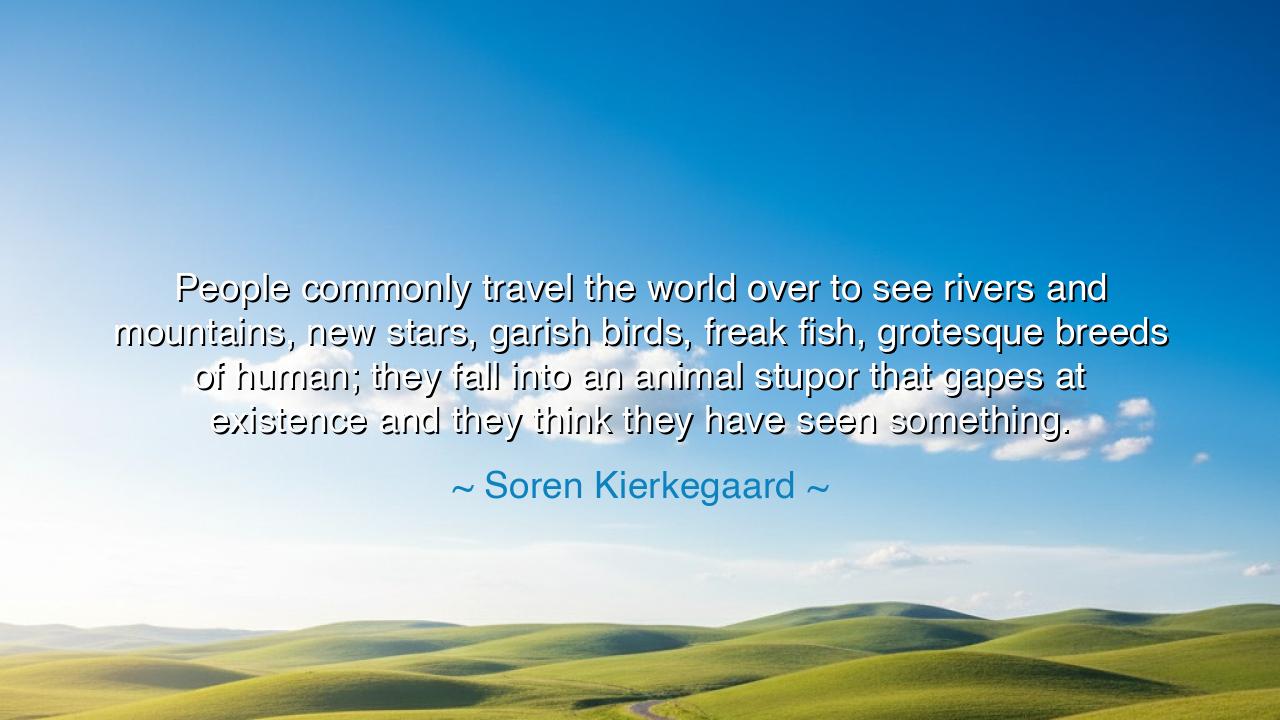
People commonly travel the world over to see rivers and
People commonly travel the world over to see rivers and mountains, new stars, garish birds, freak fish, grotesque breeds of human; they fall into an animal stupor that gapes at existence and they think they have seen something.






Søren Kierkegaard once thundered in quiet irony: “People commonly travel the world over to see rivers and mountains, new stars, garish birds, freak fish, grotesque breeds of human; they fall into an animal stupor that gapes at existence and they think they have seen something.” In these words, the philosopher unmasks the hollowness of wonder without reflection. He speaks not against travel itself, but against the blindness that mistakes mere spectacle for true understanding. His cry is that life is not to be consumed as entertainment, but to be perceived with depth, inwardness, and reverence.
The rivers and mountains, the stars and creatures of the earth—these are indeed marvelous. Yet Kierkegaard warns us that to gape at them in an animal stupor, like beasts staring at fire, is to miss their meaning. To look without contemplation is to see without truly beholding. It is to stand before the ocean yet never taste its eternity, to gaze upon the stars yet never ask what they whisper to the soul. True vision, he reminds us, is not of the eyes but of the spirit.
The ancients knew this well. Consider Diogenes, the philosopher who walked the streets of Athens with a lantern in daylight, seeking an honest man. To the crowd, it was a strange spectacle; they laughed as though watching a grotesque breed of human. Yet for Diogenes, it was a lesson: the eyes see only the act, but wisdom perceives the truth behind it. So too with Kierkegaard: he warns us that we may wander the earth, gazing upon wonders, yet remain blind to their true weight if we do not look inward.
History also gives us the tale of Alexander the Great. He conquered lands, crossed mighty rivers, scaled mountains, gazed upon strange peoples and unheard-of beasts. Yet when he stood before the ocean at the edge of India, he wept—for though he had seen much, he realized he had grasped little of life’s meaning. His was the cry of a man who mistook conquest for understanding, who thought he had “seen something,” but discovered emptiness in his hands. Kierkegaard’s words are an echo of this eternal paradox: the world may be wide, but sight without depth yields only vanity.
This is the danger of the animal stupor: to gape without reflection, to collect sights as trophies without transformation. In our age, it is the traveler who rushes from landmark to landmark, camera in hand, yet carries home no wisdom but only images. He has “seen” the mountains, yet never felt the patience of their silence. He has “seen” the stars, yet never trembled at the infinity they declare. He returns as empty as he departed, for he mistook movement for meaning.
The lesson, therefore, is profound: do not mistake existence for presence. To see is not enough—you must behold. To behold is not enough—you must reflect. And to reflect is not enough—you must allow the vision to change you. Let the river teach you persistence, let the mountain teach you steadfastness, let the stars teach you humility. Without this transformation, you are as one who eats without tasting, who listens without hearing, who travels without arriving.
Practical action lies before us. When you travel, slow your steps. Do not rush to “see” everything; instead, choose to truly encounter a few things. Put aside the urge to gape, and instead ask: What does this teach me? What does it stir within my soul? Write reflections, not just itineraries. Seek not the grotesque or the rare for its own sake, but the eternal truths hidden within the common. Even a blade of grass, rightly beheld, holds more wisdom than the parade of freak fish if viewed without depth.
Thus Kierkegaard’s words stand as an eternal commandment: Do not fall into the stupor of the beast. Awaken your vision. Let the world not only pass before your eyes, but enter into your soul. For in this way, every journey becomes more than spectacle—it becomes transformation. And the one who truly sees, even if he never leaves his home, will behold more than the restless wanderer who circles the earth with an empty gaze.






AAdministratorAdministrator
Welcome, honored guests. Please leave a comment, we will respond soon